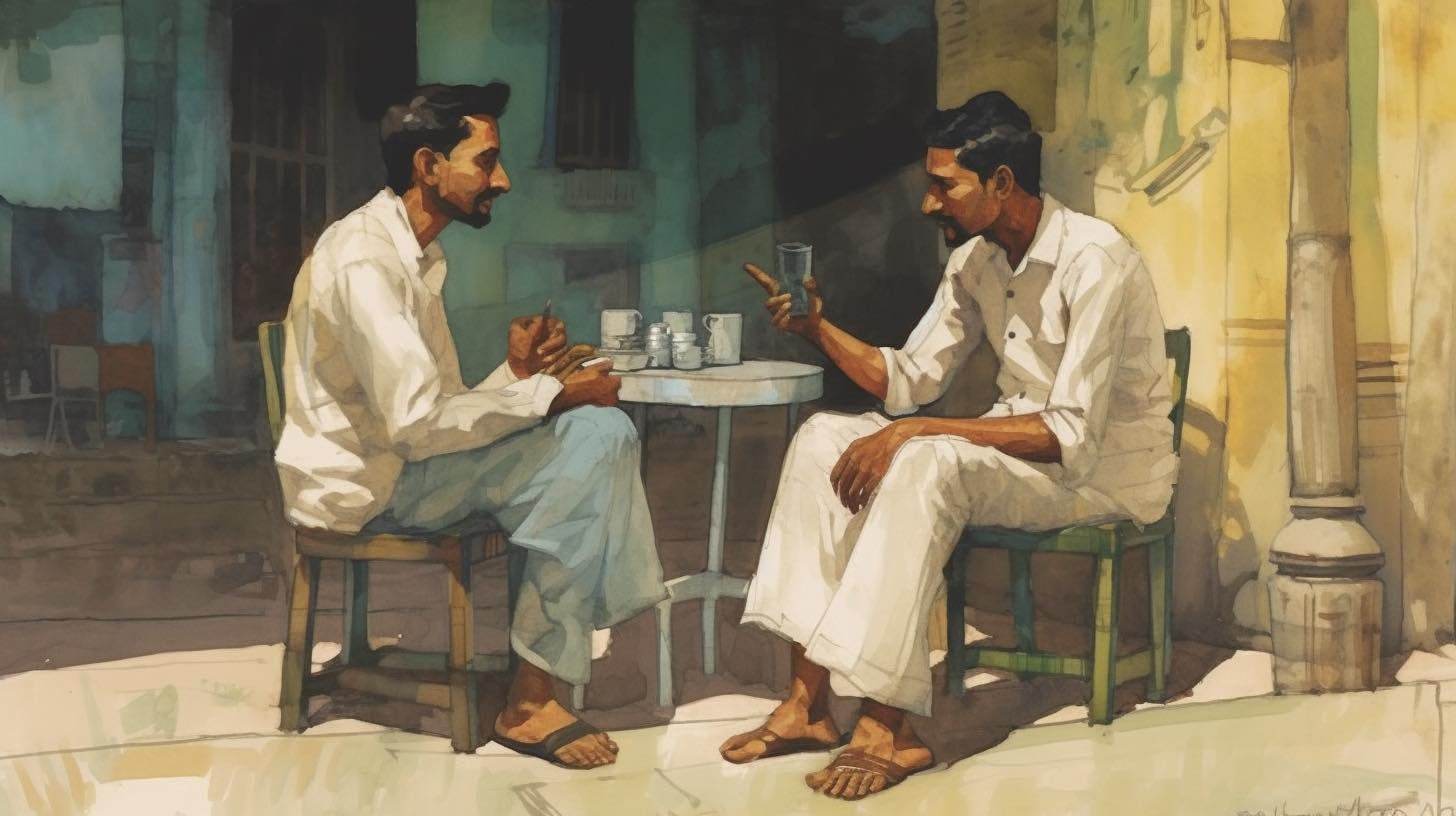Vairāgya: A Satire

Vairāgya
“Renunciation”
By Śrīla A.C. Bhaktivedānta Svāmī Prabhupāda (then Śrī Abhayacaraṇa Bhaktivedānta Prabhu)
Translated from Śrī Gauḍīya Patrikā, Year 5, Issue 1 (28/2/1953), page 14
Characters:
(1) Svāmi Kāñcana-vilāsa “Swami Gold-frolic” Sevaite and trustee No. 1
(2) Ananta-kāma “Infinite Lust” Caramahaṁsa Sevaite and trustee No. 2
(3) Snehasikta Gṛhavinoda “Mollycoddle Home-joy” Sevaite and trustee No. 3
(4) Janaika bhadraloka “The Gentleman” A burn-out from worldly life
(5) Prativāsī “The Neighbour” His only friend
(6) Udarānanda Svādu “Gourmand Delights” The canvasser
(7) Bhūdhara Svāmī “Landholder Swami” A strict sannyāsī
(8) Nibhṛta-kumārī “The Lonely Maiden” Sevaitini
Setting: jagat-mithyā “the world of falsity”
Period: sadā-sarvadā “always and forever”
Act: Advitīya – “Like None Other”
First Scene
A gentleman and his neighbor enter the scene.
Neighbor: I say sir, how’s the daughter’s wedding coming along?
Gentleman: Do you have to ask? I was thinking I would give up family life once she was married. But the Lord has other plans. I've had to spend all the savings I’d put aside.
Neighbor: How’d you manage to spend all that? How were you left with no other option?
Gentleman: Legal battles with relatives. Three years of litigation; three times in the high-court, and what to speak of all the times in family court. Eventually I won the case, but not before it cost me three grand. Now how am I supposed to arrange my daughter’s wedding?
Neighbor: So what’s your plan now?
Gentleman: You really are my one true friend. I won’t keep anything from you. If you’ll listen, I’ll open up to you. But not if you’re going to laugh.
Neighbor: What are you talking about? Would I laugh at your hardship? Don’t even think that. If you consider me a friend, you have to know I only want the best for you. You can tell me anything, without hesitation.
Gentleman: Well, I was thinking to become a sannyāsī at the Murgī ["Chicken"] Mission. I don’t like family life anymore. It’s not a big deal to join the Murgī Mission. They are very liberal! No big conflicts of opinion; everyone is free to do as they please. And best of all: there are no particular restrictions for sannyāsīs.
Neighbor: But if you take sannyāsa…you can’t ever come back home. The Murgī Mission certainly has no restrictions against pān, cigarettes, fish, meat and poultry. All you have to do is study Vedānta and occasionally distribute some homoeopathic medicine. But once you don red cloth, you can’t come home! What’ll happen to your wife?
Gentleman: I was talking to my wife about this. She has a friend back in her father’s neighborhood whose husband became a sannyāsī in the Murgī Mission. But he comes home from time to time, so my wife’s friend has no worries. Groceries, clothing, jewelery—she wants for nothing.
Neighbor: What are you saying? A sannyāsī coming home and mixing freely with his wife? I’ve never heard of such a thing.
Gentleman: Why brother, what’s the harm in that? If a sannyāsī can take pān, cigarettes, fish, meat and poultry, then what’s the big deal if he goes home?
Neighbor: You’re making a mistake. Eating fish, meat and poultry is mentioned in scripture. Not to mention fish and meat, the ancient sages would apparently partake of beef after sacrifice. Of course, the cow is a sāttvika animal. I’ve heard that eating beef increases sattva-guṇa. But a sannyāsī returning home? I’ve never heard of such a thing! Being a sannyāsī means giving up your wife, children and home. If you go back home, then what is the meaning of sannyāsa?
Gentleman: (gravely) So you know a fair bit of scripture do you?
Neighbor: I…can’t say that I do. We are simple family men. Where is the time to study scripture? I just know what I’ve heard here and there.
Gentleman: Rāvaṇa took sannyāsa, did you know that?
Neighbor: Yes, I have heard that…but he took sannyāsa to kidnap Sītā! That’s not real sannyāsa.
Gentleman: Leave all this talk of real and unreal. Do you know what the Gītā says? “Kāryaṁ karma karoti yaḥ saḥ sannyāsī.” That means a sannyāsī is someone who acts with total conviction in accomplishing his goal. Rāvaṇa had no choice but to kidnap Sītā. There is something called prestige, wouldn’t you agree?
Neighbor: Of course. They say: “I can give up my life, but never my dignity.” Rāvaṇa’s poor sister had her nose cut off for no reason. She was the daughter of such an illustrious family. Her brother was Rāvaṇa himself, and she got her nose cut off! What a loss of prestige, am I right? What choice was there but to retaliate? Sītā had to be kidnapped. But one thing—see, I read the Gītā a little too, and the line you quoted, doesn’t it say “anāśrita-karmaphalaṁ – not resorting to the fruits of action” just before that?
Gentleman: Okay, yes, indeed it does. “Anāśrita-karma-phalaṁ” means that whatever you do as a sannyāsī, you will not have to endure the reaction. So whatever I want to do, if I take sannyāsa, I won’t have to experience the results of my action like ordinary people do.
Neighbor: So being a sannyāsī means you can do as you like?
Gentleman: You’re taking that wrong. I already said, “kāryaṁ karma karoti yaḥ saḥ sannyāsī.” When there is something you really have to do—when you have that kind of conviction, then you can do whatever it takes to achieve that goal. All you have to think is: “I’m not doing anything.” And voilà, that’s niṣkāma-karma! So, if I visit home as a sannyāsī but I’m thinking “I’m not visiting home,” then, and only then, is it sannyāsa. All these spiritual topics are difficult to understand. I’ve given a great deal of thought to this matter. Please don’t get me wrong.
Neighbor: Say what you will, but visiting home in red cloth just looks really bad.
Gentleman: What choice do I have? If I take red cloth and just disappear, my household will fall apart. And if I stay in white cloth and tend to my household, I won’t have an income, and my daughter’s wedding won’t happen. If I put on red cloth and collect donations, I’ll be supporting both the maṭha and my home—and it’s much better than working. So I’ll collect some donations and split it fifty-fifty—half for the Murgī Mission and the other half for my family. That way, there won’t be any problems whatsoever. When this is something I have to do, then that’s “kāryaṁ karma karoti yaḥ,” isn’t it? And when I’m giving fifty percent to the mission, that’s “anāśrita-karmaphalaṁ.” The other fifty percent will cover my own expenses. And the scriptures say: “yuktāhāra-vihāraś ca – one should balance one’s needs and recreation.” So what I’m saying makes sense, doesn’t it?
Neighbor: You are far more learned than I am; I can’t possibly debate the scriptures with you. But taking the red cloth of sannyāsa and then visiting your home—I can’t agree with that at all.
Gentleman: Then what do you think I should do?
Neighbor: If you become a sannyāsī in the Bhojanākhaḍā [“Dining Ashram”], you can see to all your needs without putting on red cloth.
Gentleman: How is that?
Neighbor: I overheard the sevaites and trustees of the Bhojanākhaḍā talking. One of them is a sannyāsī, one is the grandfather of sannyāsīs, that is, first he was a brahmacārī, then became a sannyāsī, and finally a householder. Becoming a householder after being a sannyāsī is the ultimate (carama) stage, so we can call him a parama-paramahaṁsa or a caramahaṁsa. In other words, they have surpassed paramahaṁsa-ness, climbing right across its back, reaching the ultimate āśrama. The other is a householder through and through. But all three of them—the sannyāsī, the grandfather of sannyāsīs and the outright householder—are all equal proprietors of the Bhojanākhaḍā. They divide everything between the three of them equally.
Gentleman: Really? Even as a householder you can become a sevaite like a sannyāsī? Fantastic! This works out really well. Tell me a bit more about this whole arrangement.
Neighbor: I can’t really tell you much, but I spoke to a canvasser of theirs. If you like, I can take you to see him. And he might be willing to introduce you to those sevaites.
Gentleman: Really? What’s the gentleman’s name? Where can we find him?
Neighbor: I’m not really sure of his name, but we call him Udarānanda Svādu, or “Gourmand Delights”. I know where he lives.
Gentleman: What kind of name is “Gourmand Delights.” What does that mean? Quite a mysterious name.
Neighbor: He introduces himself as Gourmand Delights. But one day I saw him on Harrison Road stopping Marwaris and saying, “Hey Seṭh! Would you feed a sādhu? Come on, feed a sādhu.” After he’d accosted about four of these Marwaris like that, one of them took him to a restaurant and fed him sumptuously. Since then we’ve been calling him Gourmand Delights.
Gentleman: Hahaha! You sir are quite a witty (rasika) chap it seems. So what’s the deal with the Marwaris? Do they just feed any sādhu on the street?
Neighbor: Oh, if some “svādu” canvasses people on the street, sooner or later someone will give in. Though that’s only possible in the Marwari neighborhoods, not in the Bengali ones.
Gentleman: No need to slander Bengalis like that. They may not indulge these svādus, but you can’t say that they don’t serve the svādus at all. I was in Mumbai for some time. The Murgī Mission sannyāsīs there would often phone the devotees saying: “Give us some of Mā’s prasāda today.” I know for a fact that those Bengali devotees would nicely feed the sannyāsīs fish, meat, duck-eggs, chicken and pooris. What are you trying to say? That Bengalis don’t serve svādus?
Neighbor: I’m not quite following you. Why would the Murgī Mission svādus telephone people and invite themselves over? All these things are available in their own mission. Why would they make such a request? Do they have a shortage of food?
Gentleman: Am I saying they are in want of anything? Weren’t you just talking about keeping up appearances? Most of the people in Mumbai are Gujaratis, Jains and Vaiṣṇavas; they never eat fish or meat. That’s why the Murgī Mission doesn’t want to be seen cooking those things in their ashram. Whenever they do want to have it—because you can't be vegetarian all the time—they call the Bengali devotees. Anyway, that’s enough about that. Back to the main topic: You were going to take me somewhere? It would be a great help if you did.
Neighbor: So you’re absolutely set on leaving family life?
Gentleman: Leaving means this fifty-fifty set-up, and I have to be able to visit home. If you think it’s a bad idea to visit home in red cloth, then white cloth will do just fine.
Neighbor: Alright, Wednesday morning I’ll take you to Gourmand Delights. ‘Maṅgaler uṣā budhe pa, yathā icchā tathā jā – the cusp of Tuesday at the stead of Wednesday; let whatever it is that you wish lead your way.’
(To be continued…)
Śrī Abhayacaraṇa De Bhaktivedanta
Editor of Back to Godhead (Allahabad)

